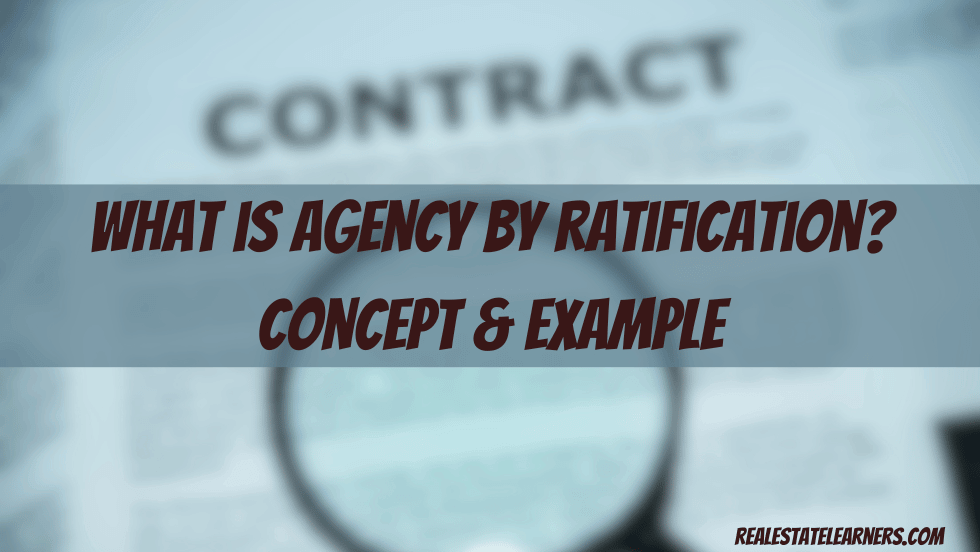Regarding the real estate industry, there are various terms and concepts that one needs to be familiar with to understand how things work. One such concept is the “ratification agency,” an essential aspect of real estate transactions.
This document will dive into the definition of agency by real estate ratification, its significance in the real estate industry, and some examples to help you understand it better.
What is an Agency by Ratification?
An agency by ratification is a type of agency relationship formed after an agent’s actions have already been taken without prior authorization from the principal. In this scenario, the principalcan either accept or reject the agent’s actions.
This type of agency can arise in various situations, such as when an agent acts on behalf of a person who is believed to be the principal but is not. It can also occur when an agent exceeds their authority in a particular matter.
This type of agency relationship is based on the principle of ratification, which means that the principal acknowledges and accepts the agent’s actions after they have been carried out. This acceptance can be either explicit or implied.
Implied ratification occurs when the principal’s behavior suggests they have accepted and affirmed the agent’s actions.
One of the key elements of an agency by ratification is that the principal must have the legal capacity to agree. This means that they must be mentally competent and of legal age. If a principal has this capacity, their ratification may be valid.
What is an Example of Agency by Ratification?
An individual hires a real estate agent to sell their property, but the agent mistakenly signs the contract under their name instead of the principal’s. The principal later learns of this and decides to ratify the sale.
A minor purchases a laptop from a store using their parent’s credit card without permission. The parent later finds out and chooses to ratify the purchase.
A company’s sales representative sells a product to a customer at a discounted price without prior authorization from their employer. The employer later approves and ratifies the sale.
An employee of a construction company orders more materials than necessary for a project, thinking it will be beneficial in the long run. The company later decided to ratify the purchase.
A lawyer represents a client in a legal matter, but the client later learns that the lawyer needed proper authorization to act on their behalf. The client chooses to ratify the actions of the lawyer.
What is Principal in Agency by Ratification?
The principal is the person who authorizes an agent to act on their behalf. In an agency by ratification, the principal comes into the picture after the agent’s actions have already been taken without prior authorization.
The principal holds a significant role in this type of agency relationship as they ultimately have the power to either accept or reject the actions carried out by the agent. If the principal accepts the actions, it is known as ratifying the agency.
The principal needs to have full knowledge and understanding of the actions taken by the agent before they can ratify them. This includes being aware of any risks or potential consequences of those actions.
What is an Agent by Ratification?
An agent by ratification is a person who has performed actions on behalf of another party without prior authorization but later receives confirmation and acceptance from the principal. This agency relationship is formed after the fact instead of being created beforehand.
One typical example of an agent by ratification is when someone acts on behalf of another person who they believe to be the principal but is not. In such a scenario, the agent can seek ratification from the actual principal to validate their actions.
The concept of an agent by ratification is based on the principle that a person should not be held liable for their actions if they believed they were acting with authority. If the principal accepts and validates these actions, then the agent becomes authorized and responsible for their actions.
What is the major difference between agency by estoppel and agency by ratification?
Agency by estoppel is based on the principle of apparent authority, whereas agency by ratification is based on implied or express ratification.
Apparent authority refers to a situation where a principal actively or passively allows someone to act on their behalf, leading others to believe that person has the power to do so.
Implied or express ratification, on the other hand, occurs when an agent’s actions are accepted and affirmed by the principal after being carried out without prior authorization.
Agency by estoppel typically arises when a third party is misled into believing that an agency relationship exists between the principal and the agent.
On the other hand, agency by ratification can occur for various reasons, such as when an agent acts on behalf of someone they believe to be the principal or when they exceed their authority in a particular matter.
In agency by estoppel, the principal is bound by the actions taken by the agent, even if they did not explicitly authorize them. However, the principal can either accept or reject the agent’s actions in the agency by ratification.
Agency by estoppel requires that the third party rely on the agent’s apparent authority, while agency by ratification does not require this reliance.
Ultimately, both types of agency relationships involve actions carried out without prior authorization from the principal but differ in how they are validated and accepted. So, there are some differences between an agency by estoppel and an agency by ratification. The main takeaway is that the estoppel agency relies on the agent’s apparent authority. In contrast, agency by ratification depends on the implied or express acceptance of the actions by the principal.
Conclusion
In conclusion, agency by ratification is a crucial aspect of the real estate industry. It allows for situations where an agent may act without prior authorization but later receives acceptance and validation from the principal.
Understanding the concept of agency by ratifying real estate is essential for principals and agents in the real estate world, as it can have significant legal implications.
By knowing ratification real estate definition components, examples, and differences from other types of agency relationships, individuals can make informed decisions and avoid potential legal issues in the future.

Corey has over 15 years of experience as a real estate broker and educator. He is dedicated to providing valuable insights and guidance for those looking to enter the real estate industry.

